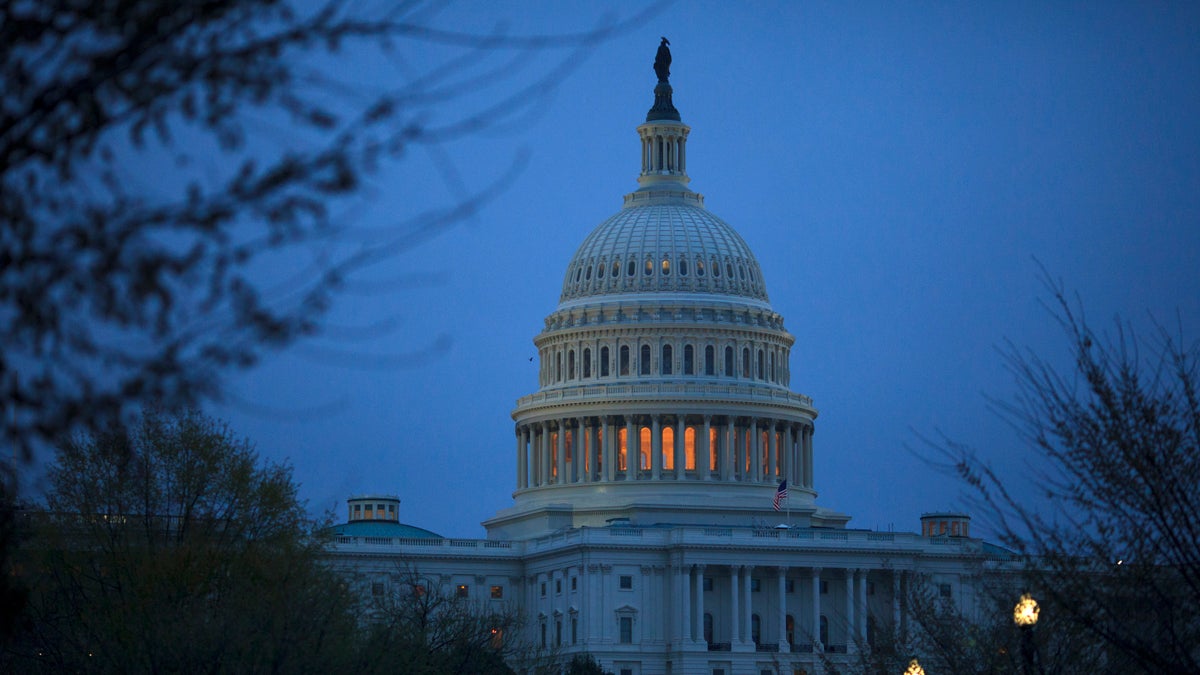Blue states targeted under GOP tax bill may wage court battle
Listen 5:01
The Capitol in Washington is seen early Thursday, April 6, 2017. (J. Scott Applewhite/AP Photo)
With a major, Republican-led overhaul of the federal tax code underway in Washington, D.C., a group of Democrats that includes New Jersey Gov.-elect Phil Murphy is talking about resisting the deal by taking a page from Republicans and filing a lawsuit to block it.
Murphy, who will take office in mid-January, joined with New York Gov. Andrew Cuomo and California Gov. Jerry Brown yesterday to condemn the tax changes that Republicans in the U.S. House of Representatives and Senate have been pushing in recent weeks. They argued the federal legislation would disproportionately hit their states the hardest by scaling back a key tax write-off known as SALT that’s currently allowed for taxes paid to state and local governments.
Three states, 40 percent GDP
The three Democrats said they were worried that the changes will negatively impact the economies of their respective states, which produce an estimated 40 percent of the nation’s total gross-domestic product. Thus, they will do whatever is in their power to block the tax-code revisions if they are ultimately signed into law by President Donald Trump.
“We’re going to have to take this to the limit,” Murphy said yesterday during a conference call with the two Democratic governors.
“This is double taxation and I’m not even sure it’s legal, and we’re going to find out whether it is,” Cuomo said.
Although there are two different pieces of tax-policy legislation that have made it out of the House and Senate in recent weeks, they have several things in common. They include a major corporate tax-rate cut, and significantly easing the way the estates of the very wealthy are taxed by the federal government. Changes to individual income-tax brackets have also been proposed, although not in the same way in the House and Senate bills, something leaders of both houses are hoping to fix in the coming days.
Ending the SALT deduction
To help pay for the sizable tax breaks the Republicans want to enact, both tax measures call for the elimination of many tax deductions and exemptions. They include the SALT deduction, which right now gives taxpayers the ability to write off the taxes they pay to state and local governments, including income, sales, and property taxes.
The deduction has been a part of the federal tax code for more than a century. Its proponents say that allowing the write-off prevents double or even triple taxation of the same personal income by multiple layers of government, a theme that goes back all the way to the country’s colonial days and the influential Federalist Papers. But opponents of the deduction argue that it essentially rewards high-tax states like New Jersey for not having more discipline, while also forcing taxpayers in more frugal locations to subsidize those in less thrifty areas.
Yet in many of the states where residents benefit the most from the SALT deduction, taxpayers contribute more to the federal government in taxes than they get back from Washington in the form of federal funds and services. That point was stressed by the three Democratic leaders during the call yesterday.
“It’s very simple. The federal government doesn’t subsidize those states,” Cuomo said. “We put more into the till than we take out.”
By some estimates, more than 40 percent of New Jersey residents currently claim the SALT deduction to lower the total amount of their income that can be taxed by the federal government. And with property tax bills that average $8,549, and a per-capita state income tax burden of nearly $1,500, the hit for many New Jersey residents could be significant. That’s led to concerns that the tax legislation could ultimately hurt the broader state economy, including the housing market.
While both tax bills right now preserve a federal property tax deduction worth up to $10,000, Murphy said that threshold will still leave out many homeowners in north Jersey where property taxes run well above the statewide average.
“We have 21 counties in our state, (and in) four counties — four big ones I might add — the average tax bill, the average property-tax bill, is well over $10,000,” Murphy said. “It helps, but it leaves a whole lot of other folks on the outside looking in.”
While property taxes aren’t as big a problem in California, Brown said income taxes are a key concern in his state, which ranks in the top five among all states when it comes to per-capita income-tax burden. A good portion of the revenue generated from California’s income tax currently goes to fund public schools, Brown said.
“The whole thing is very nefarious,” he said.
Cuomo, meanwhile, also said that even as the three leaders are weighing their legal options to oppose the tax-code changes, they’re also getting ready to mount a major push to fight it politically. Cuomo warned the GOP members of Congress in their states who vote to give the tax legislation final approval that they will soon be running for re-election. He also held up the GOP’s constant “repeal and replace” rallying cry against Obama’s signature Affordable Care Act as an example of the type of movement that the Democrats will soon begin if the tax legislation becomes law.
“If they do this, the next day, we’re going start the ‘repeal and replace’ the divisive tax act,” Cuomo said.
WHYY is your source for fact-based, in-depth journalism and information. As a nonprofit organization, we rely on financial support from readers like you. Please give today.




